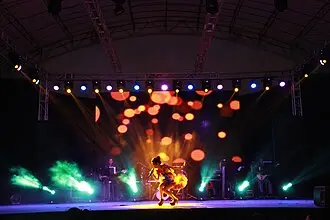
Curious about the glowing stages you see in HDB estates during the Hungry Ghost Festival? Those are getai (歌台) shows — live performances meant to entertain both the living and the dead. Here's everything you need to know about this uniquely Singaporean tradition in 2025.


Getai, which literally means “song stage” in Mandarin, refers to a series of open-air concerts held during the Hungry Ghost Festival, especially in the 7th lunar month. These performances are meant to entertain wandering spirits, who are believed to roam the human world during this period.
At the same time, getai has evolved into a lively neighbourhood event — bringing together residents for an evening of dialect songs, LED lights, flashy costumes, and humour. While it began as a religious custom, modern getai is part tradition, part entertainment, and all heartland Singapore.

23 August 2025 (1st Day)- Start of the 7th Lunar Month. Gates of the underworld open.
6 September 2025 (15th Day) - Ghost Day (中元节). Spirits are believed to be most active.
21 September 2025 (30th Day) - Final day. Offerings made to send spirits off peacefully.

According to Taoist and Buddhist beliefs, spirits of the dead are released from the underworld during the 7th month, and they seek food, comfort — and entertainment.
Getai shows are staged to:
An important custom: The first row of seats is always left empty — reserved for unseen guests. Even if the crowd is small, locals know better than to sit there.

Modern getai shows are a colourful blend of pop concert and cultural showcase. Here’s what you’ll typically see:
Some shows have a more traditional flavour (Chinese opera, puppet shows), while others are full-on variety acts with K-pop dance covers, drag performances, or even EDM tracks. Many are now livestreamed as “e-Getai” for wider audiences.

While fun, getai is still a sacred offering. Keep these customs in mind:

As of August 2025, here are some of the officially announced getai events happening across Singapore during the Hungry Ghost Festival season:
Since the pandemic, many organisers have embraced livestreamed performances, known as e-Getai. These are broadcast live on Facebook, YouTube, or event platforms, often with live chat, auctions, and even donation links.
You can watch from home — but even online, the emcees often remind viewers to be respectful, as the spirits are believed to still be present.
Some popular channels:

Singapore’s early Chinese migrants — Teochew, Hokkien, Cantonese — brought with them dialects that formed the backbone of heartland life. Getai is one of the few public spaces where these dialects are still performed, sung, and celebrated.
If your grandparents speak Hokkien, there's a good chance they learned those songs from getai — or sang along with them under the block.
By watching getai, you’re not just hearing music — you’re listening to the language of an older Singapore.
Getai didn’t start in concert halls — it began in makeshift tents, open carparks, and HDB void decks. It’s a reminder that culture doesn’t need to be expensive or exclusive to be meaningful.
Getai is grassroots culture — performed by the people, for the people.
It brings together hawker centre aunties, delivery riders, students, temple volunteers, and grandparents — everyone shares the same front row (except for the spirits).
Many getai performances begin with a moment of silence, or a prayer for peace. The songs and skits aren't just for laughs — they're also offerings to ancestors and unseen spirits.
That mix of fun and reverence is rare in modern life.
Where else do you sing and laugh for ghosts — while also showing deep respect?
It reminds us that Singapore’s culture isn’t just pragmatic and efficient — it’s spiritual, layered, and human.
You won’t find getai in China or Taiwan the way it exists here. It’s a product of our multicultural, multilingual, heartland blend — part opera, part karaoke, part live auction, part religious rite.
There’s nothing else quite like it — it’s KTV, community, and culture all in one.
For younger Singaporeans looking for identity or heritage, getai is a living thread to your own history — a chance to see how your great-grandparents might have prayed, celebrated, or grieved.

Planning to attend your first getai? Read these next: